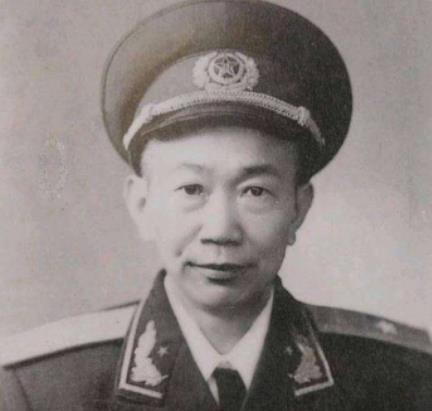In 1952, China conducted a grade assessment of cadres who were still serving in the military, and this rating became the main basis for awarding titles three years later. In this classification, the commanders of the corps have become the rank of the main corps. It is said that the deputy commander of the corps should be at the rank of deputy corps, and even if it is not good, it should be the rank of a quasi-corps. However, there was one person who was demoted to the third rank of the vice army, and he was Liu Yongsheng, deputy commander of the 10th Corps of Sanye.

Liu Yongsheng, a native of Shanghang, Fujian Province, was born in 1904 by his father as a sharecropper for a landlord's family. Due to years of hard work and malnutrition, Liu Yongsheng died of illness when he was 5 years old. The family has lost its pillar, and life is even more difficult. In order to make a living, Liu Yongsheng begged for food, worked as a small long-term worker for the landlord's family, and worked as a porter. I have suffered a lot and suffered a lot of tiredness.
In the autumn of 1927, Zhang Dingcheng, one of the founders of the revolutionary base area in western Fujian, came to the Shanghang area to engage in revolutionary activities, established peasant associations in many villages, propagated revolutionary ideas, and mobilized the masses to carry out revolution. Liu Yongsheng, 23, first joined the peasant association, then soon joined the Red Army guerrillas and followed the troops to liberate the county seat of Yongding. After that, Liu Yongsheng successively participated in the agrarian revolutionary war, the War of Resistance Against Japanese Aggression and the War of Liberation, and made important contributions to the victory of the Chinese revolution.
During this period, Liu Yongsheng held many positions, the highest position being deputy commander of the 10th Corps of Sanye. When he was reassigned in 1952, Ye Fei, commander of the 10th Corps, was at the rank of a regular corps, and it was said that Liu Yongsheng should be a deputy corps level, and even if he was unlucky, he should be a quasi-corps level. Unexpectedly, he was eventually appointed to the rank of deputy army, and he was not even rated at the rank of regular army. It is equivalent to being demoted three levels in a row, what is going on?
When the rank was rated in 1952, it was mainly based on seniority, position and military merit. Let's talk about seniority first, although Liu Yongsheng joined the Red Army team very early, he has always served in the local army. During the Agrarian Revolutionary War, he served in the Fujian Provincial Military Region, successively serving as the commander of the Yongding Independent Regiment and the commander of the 8th Regiment of the Independent 8th Division of the Military Region. Although they were all regimental commanders, there was still a big difference between the regimental commanders of the local military districts and the regimental commanders of the main Red Army. After the Long March, liu Yongsheng remained in the south and persisted in three years of arduous guerrilla warfare.
After the outbreak of the War of Resistance Against Japanese Aggression, the main forces and guerrillas of the Red Army in the eight southern provinces were reorganized into the New Fourth Army, and Liu Yongsheng was incorporated into the 2nd Detachment of the New Fourth Army and was ordered to serve in southern Anhui. However, when he reached Jiangshan, Zhejiang, he suddenly received an order from his superiors to return to western Fujian to continue the struggle, so Liu Yongsheng missed the opportunity to join the main force. In western Fujian, Liu Yongsheng successively served as the chief of the Armed Economic Work Corps in southwest Fujian and the head of the Wang Tao detachment.
During the Liberation War, Liu Yongsheng still served in the local troops, successively serving as the commander of the People's Liberation Army Corps in Fujian, Guangdong, and Gansu, and the commander of the column in the Fujian-Guangdong-Gansu Border Region. After the founding of New China, the 10th Corps of Sanye entered western Fujian to suppress bandits. Because Liu Yongsheng had served in western Fujian for a long time, he was extremely familiar with the terrain and customs of this area, and also had a high reputation among the people, so he was appointed by his superiors as the deputy commander of the 10th Corps of Sanye. From this point of view, throughout the war years, Liu Yongsheng basically served in the local army, and his qualifications were slightly insufficient, which affected his rating to a certain extent.
Look at the battle achievements. During the Agrarian Revolutionary War, the War of Resistance Against Japanese Aggression and the War of Liberation, Liu Yongsheng always led his troops to fight in the western Fujian region, often facing the attack of enemies several times his own, and the situation was more difficult than the main force. During this period, although he fought a lot of good battles, due to the limited number of troops in his hands, the number of annihilated enemies was not very large, so his battle achievements did not look so prominent. His seniority and military achievements were not outstanding, and he only served as the deputy commander of the corps after the founding of the People's Republic of China, so when he was relegated in 1952, Liu Yongsheng was finally designated as the deputy commander of the corps and was awarded the rank of major general in 1955.